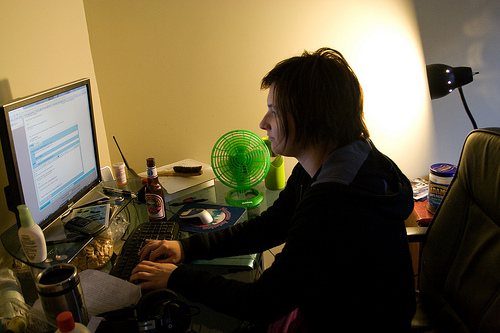This is our final post in a series about bullying. In our first blog post, we discussed how to handle a situation in which your children are being bullied; in the second post, we talked about how to overcome the feelings you can be left with after being bullied.
The Internet is a great tool for teens; it makes researching and writing a paper much easier, it makes downloading new music a breeze, and it helps them keep in touch with friends. However, it comes with its own set of dangers.
What is Cyberbullying?
According to the American Humane Association, cyberbullying is a newer phenomenon in which youth use technology (computers, cell phones, tablets, etc.) to harass, threaten, humiliate, or hassle their peers.
Cyberbullying can include sending mean emails or text messages, spreading rumors or private information via texts, Facebook messages, or Twitter, using social networking sites to make fun of others, and posting embarrassing pictures or videos of others online.
Often, cyberbullying can be more harmful and harder to stop than face-to-face bullying. It can occur during or outside of school hours, and it isn’t as visible to school teachers. Images and messages can be Tweeted, forwarded, or posted in seconds.
What if My Child is Being Cyberbullied?
If your child is being cyberbullied, remain calm. Let your child tell you what is occurring, how long it has been going on, and what he’s done to try and stop it. Depending on what type of cyberbullying you are dealing with, it might be beneficial to go to a school counselor, trusted teacher, or principal.
If your child is nervous about saying something, see if there’s a way to report the incident anonymously. It’s possible that you’ll have to involve the police if the cyberbullying is criminal or you are concerned that it might become criminal in nature.
The most helpful and important thing you can do for your child in this situation is to let him know that he is not to blame. Let him know that you love him and that you are going to help make the cyberbullying stop.
How Can I Be Proactive About It?
The best way to stop cyberbullying from occurring in your house is to educate yourself and talk with your kids about it.
Here are a few tips from cyberbullying.org to pass onto your kids:
- Protect your passwords: don’t give them out to anyone, not even your best friend
- Keep your photos PG: if you wouldn’t want your parents or grandparents to see them, don’t post them or send them to anyone
- Never open messages from people you don’t know: delete them because they could contain a virus
- Log out: don’t save passwords in public computers, and remember to always log out after using websites so that the next person to use the computer can’t get into your personal information
- Pause before you post: don’t post anything that might compromise your reputation
- People will judge you based on your online persona, and once you put something on the Internet, it is no longer under your control. Remember that your future bosses (and your future fiancé’s parents) are going to Google you. That may not sound important now, but it probably will someday
Knowing how to stay safe on the Internet is an important skill for young people—it should be a prerequisite to using a computer. It’s up to the parents to teach them how.
If you’d like to set up a time to meet up with Reka, you can contact her by phone at 402-881-8125, by email at reka@omaha-counseling.com, or via Twitter or Facebook.
—


